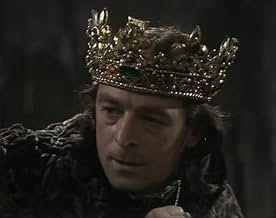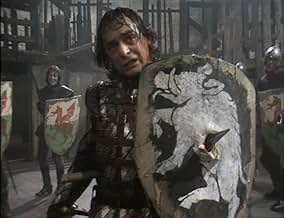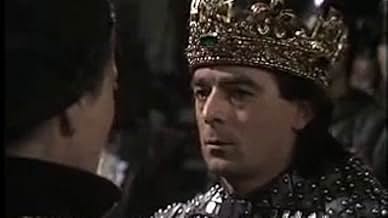IMDb RATING
8.2/10
256
YOUR RATING
Richard of Gloucester uses murder and manipulation to claim England's throne.Richard of Gloucester uses murder and manipulation to claim England's throne.Richard of Gloucester uses murder and manipulation to claim England's throne.
Antony Brown
- Sir Richard Ratcliffe
- (as Anthony Brown)
- Director
- Writer
- All cast & crew
- Production, box office & more at IMDbPro
8.2256
1
2
3
4
5
6
7
8
9
10
Featured reviews
The best Richard III on film
As a fan of Richard III, I've seen every version produced. I still do not understand why anyone likes Laurence Olivier's version with its grim, heavy-handed performance. Ron Cook is the perfect Richard, upbeat and energetic, sly and humorous, delighting in his mission until the weight of his crimes begin to trouble his conscience. Jane Powell's direction, as she did with Henry VI parts I, II and III (my favorite of the series), keeps the action moving and the characters in sharp focus, especially King Edward, whose final speech is one you'll always remember. This is the Richard that Shakespeare wanted his audience to see, a man of a courage who loses control of his ambition.
That Scheming Son Of York
That period known in the 15th century as the War Of The Roses ended with the reign of Richard III who has come down to us through a well written play and a host of great actors playing one of the great Machiavellian villains of all time. Was Richard really as bad as all that. He was no saint, but he was living in a time when one of the few saints around was Henry VI of Lancaster and he paid as dearly for sainthood as Richard did for villainy.
If you can get over the fact that Ron Cook who plays Richard III bears an uncanny resemblance to Dudley Moore, you will enjoy this BBC production of The Tragedy Of Richard III. Richard III in his time was called 'Crookback' because he was supposedly a hunchback though it never affected him on the battlefield, even his enemies conceded he was quite the man at arms. That was a bit of Tudor propaganda as spun by the court favorite William Shakespeare.
The two roles that really make this production are that of Rowena Cooper as Elizabeth Woodville, the commoner who married Edward IV and bore him the two sons who were killed in the Tower in 1483. She spent a lot of time making sure her generous and indulgent husband took care of his many in-laws. She transforms remarkably as the Queen enjoying privileges to the distraught mother whose sons were taken and murdered, probably on Richard's wishes if not unwritten orders.
One thing that should be clear. This incident with the murder of the child king Edward V and his brother Richard plays more shocking for today's audience than back at the Globe Theater in Shakespeare's day. People had an abundance of kids because the majority of them died before reaching their majority. And child monarchs mean regencies and regencies always mean court politics on steroids and dynastic challenges. People in those time need only look in Scotland to the north which had a series of child monarchs which weakened the realm so totally that it's only remedy was union with England which happened not long after people saw the first production of this play. And the three parts of Henry VI that led up to the events here began with an infant king and the struggles for power which turned into the War Of The Roses.
The other female role that stands out is Margaret Of Anjou, late the Queen consort of Henry VI who singlehandedly for her husband and son kept the Lancastrian claims going. She was and is a controversial figure in English history still. Julia Foster played her in all the stages of her life in the three parts of Henry VI and in Richard III. Ironically enough this role was eliminated in Laurence Olivier's acclaimed big screen film of this play. But seeing it now that kind of diminishes Olivier's work somewhat. Foster is a bitter figure of passion, grief, and revenge in equal parts as she curses all the new Yorkist royalty and nobility and most especially Richard of Gloucester.
For Richard it was a case of what went around really did come around for him.
If you can get over the fact that Ron Cook who plays Richard III bears an uncanny resemblance to Dudley Moore, you will enjoy this BBC production of The Tragedy Of Richard III. Richard III in his time was called 'Crookback' because he was supposedly a hunchback though it never affected him on the battlefield, even his enemies conceded he was quite the man at arms. That was a bit of Tudor propaganda as spun by the court favorite William Shakespeare.
The two roles that really make this production are that of Rowena Cooper as Elizabeth Woodville, the commoner who married Edward IV and bore him the two sons who were killed in the Tower in 1483. She spent a lot of time making sure her generous and indulgent husband took care of his many in-laws. She transforms remarkably as the Queen enjoying privileges to the distraught mother whose sons were taken and murdered, probably on Richard's wishes if not unwritten orders.
One thing that should be clear. This incident with the murder of the child king Edward V and his brother Richard plays more shocking for today's audience than back at the Globe Theater in Shakespeare's day. People had an abundance of kids because the majority of them died before reaching their majority. And child monarchs mean regencies and regencies always mean court politics on steroids and dynastic challenges. People in those time need only look in Scotland to the north which had a series of child monarchs which weakened the realm so totally that it's only remedy was union with England which happened not long after people saw the first production of this play. And the three parts of Henry VI that led up to the events here began with an infant king and the struggles for power which turned into the War Of The Roses.
The other female role that stands out is Margaret Of Anjou, late the Queen consort of Henry VI who singlehandedly for her husband and son kept the Lancastrian claims going. She was and is a controversial figure in English history still. Julia Foster played her in all the stages of her life in the three parts of Henry VI and in Richard III. Ironically enough this role was eliminated in Laurence Olivier's acclaimed big screen film of this play. But seeing it now that kind of diminishes Olivier's work somewhat. Foster is a bitter figure of passion, grief, and revenge in equal parts as she curses all the new Yorkist royalty and nobility and most especially Richard of Gloucester.
For Richard it was a case of what went around really did come around for him.
Great adaptation - why isn't it available on DVD???
Again, we see another example of a great 'lost' film. This is without a doubt the best Richard III on film (or in this case on videotape). Why, oh why, are so many such great films like this consigned to a film vault somewhere, gathering dust, when they could be making their owners lots of cash??? It's incredible to me that great works of cinematic and TV art are in danger of being permanently lost to us, while lesser works are on videotape and DVD in various versions including letterboxed, full screen, special edition, etc.
This teleplay is among the best British TV dramas ever produced. Won't someone please get great British TV dramas like this released on DVD???
This teleplay is among the best British TV dramas ever produced. Won't someone please get great British TV dramas like this released on DVD???
Superb, non-hammy working of the tale
In 1982, the BBC, in their undertaking to produce all of Shakespeare's plays, assembled a company of actors which would take us, in one logical arc, from Henry VI part one right through to Richard III. This is notable in that through all four plays, the principal actors keep their roles (although smaller roles are also undertaken). This gives an unparalleled clarity to the events as you see the chaste Margaret descend to Machiavellian plotting to destroy challengers to her grip on power, and then her downfall as Edward and then Richard take power. It is fitting that she, in a horrific scene at the end of this play, is seen atop a mound of dead. This was, after all, her legacy.
In a simple, but effective, set, with authentic costumes and asides taken directly to camera, this brings your closer to Shakespeare's work than much of the praised films and productions in the past.
If you found Olivier's version just too hammy to bear..... try this one.
In a simple, but effective, set, with authentic costumes and asides taken directly to camera, this brings your closer to Shakespeare's work than much of the praised films and productions in the past.
If you found Olivier's version just too hammy to bear..... try this one.
10MarkB-11
Trenchant begins to describe this version...
I'm fairly sure that many educated and interested-in-film folk have seen the superb and terrifying McKellen version, but sadly, I'd bet hardly anyone remembers this version, which in the original was the capstone of the cycle of plays that begins with Richard II and continues through the various Henry plays (six of 'em). The series was cast as a whole, and the list of actors is a who's-who of British acting skill, culminating in this horrorshow of a play. From the opening moments, when the camera pulls back from the last frame of Henry VI, Part III to reveal a small blackboard, onto which a disembodied hand scrawls Richard III in chalk, to the final frame, where Margaret sits, cackling hysterically atop a pile of bodies (all the characters killed in the preceding eight plays), this version assaults you and tests your ability to withstand true, and intentional villainy, as personified in the demonic Richard. See this version...plague the BBC with letters asking for it to be reissued...write to the actors and shower them with adulation..whatever it takes to return this play to the public eye, where it richardly belongs. Cheers!
Did you know
- TriviaThis episode was filmed on the same set as the three Henry VI plays. However, designer Oliver Bayldon altered the set so it would appear to be a ruin, as England reached its lowest point of chaos. In the same vein, the costumes became more and more monotone as the four plays went on; The First Part of Henry the Sixth (1983) features brightly coloured costumes which clearly distinguish the various combatants from one another, but by this point, everyone fights in similarly coloured dark costumes, with little to differentiate one army from another.
- GoofsWhen Henry VI's corpse is borne in on a brier, the Queen laments the passing of her husband. When she removes the sheets, Henry VI's stomach can clearly be seen heaving.
- ConnectionsFeatured in The Story of English: A Muse of Fire (1986)
Details
- Release date
- Countries of origin
- Language
- Also known as
- The Complete Dramatic Works of William Shakespeare: The Tragedy of Richard the Third
- Production companies
- See more company credits at IMDbPro
Contribute to this page
Suggest an edit or add missing content






























